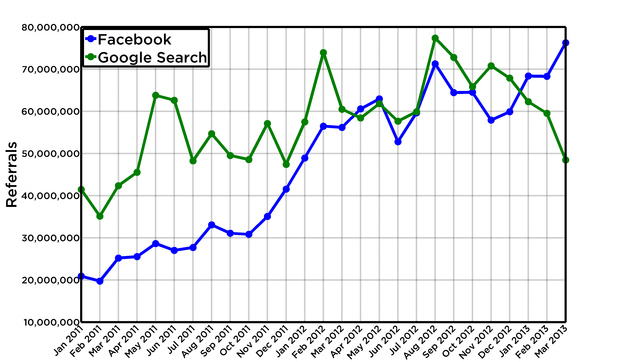Where Did All The Search Traffic Go?
BuzzFeed reports that
“Traffic from Google to digital publishers dropped 30% over the past eight months.”
based on traffic statistics from over 200 major media properties, among them
- BuzzFeed
- Time
- Huffington Post
- Rolling Stone
- Sports Illustrated
Overall social media traffic to publishers, even Facebook traffic by itself amounts to more than Google search traffic for quite a while by now, 3 months in a row.
Danny Sullivan stopped right in claiming that it’s all so called “not provided” traffic that doesn’t get shown.
That’s not true though. That’s only a small fraction. Where did all the search traffic go then? I’ll explain. The reasons are below. Take note though that search traffic outgrew social media traffic in 2017 back again.
Google Knowledge Graph
The so called Google Knowledge Graph is designed to keep searchers on Google, give them all the information they need onsite or send them over to similar search pages.
Searchers do not need to click actual search results anymore. For example Google scrapes content from Wikipedia and display it right in the results.
Google Image Search Content Theft
Google Image Search has been updated recently. The new versions steals your images and hotlinks them on Google-page.
There is no way to redirect the searcher to the image source anymore with frame-breakers or similar means.
Advanced hotlink protection can help to recover some clicks partly but can’t stop Google from this large scale content theft.
Paid Search “Results” Above the Fold
For many search queries, especially those that make money Google doesn’t display real search results right away anymore.
Instead you’ll only use ads and hidden ads that is “paid inclusion” Google services. You have to scroll to see some actual organic search results.
Most people click what’s on top instead and often do not even notice or care whether it’s an ad or not.
Social Media Dwell Time Grows, Search Dwindles
For a few years in a row the so called dwell time on social media sites has grown while the one on search sites e.g. Google dwindled.
Dwell time is the actual time you stay onsite and use it.
Users spend hours on Facebook or YouTube per week while the search only for minutes. Just think of it: wjenn you use Google it’s just the intermediary not the final destination.
That’s why Google tries desperately to push their own products and services and grabs third party content to make people stay on site.
People Visit Sites Directly
When I searched for [seo] I’ve seen almost the same low quality search results for a few years in a row.
- Wikipedia
- Google’s own “SEO” FAQ
- some information for beginners
- a few spammy sites.
When I search for something new on the topic I use other sources. Twitter is still a good place to find the latest trends and content.
I use Tweetdeck and other tools. I check what my social media friends share. Thus using search is only for first time users in many cases.
Once you know where you want to go, you can go directly. I will check out SEMrush or Search Engine Journal without the help of Google.
A Small Amount Gets Misattributed
Google hides most of so called referral data from publishers. That is why they will see that some came from search to their site but not what they searched for unless they use Google’s proprietary tools to find out. Think Search Console.
Publishers have to buy ads on Google to see keyword data. That called “privacy” in Google’s Newspeak.
The Safari browser on some mobile devices, that is newer Apple products will hide that traffic altogether and won’t tell you that it’s search traffic at all.
Answers Instead of Search Results
What’s the overall trend here? Google tries to become a destination itself. The gate-keeper is closing the gate more often so that fewer searchers can go though.
Modern search is about answers not search results. Google is not a search engine it’s an answering machine these days. For businesses it’s just a toll-booth. You have to pay the gatekeeper to get let inside the increasingly walled garden.
It’s no wonder that Google traffic dwindles. Their short term goal is to keep users on Google and grab as much third party content as possible.
When it comes to mobile interfaces or images the process is already very painful to publishers. Social media also replaces search for many people. You rather trust your friends than a buggy Google algorithm.
Where did all the search traffic go? Most of it didn’t go anywhere, it stayed on Google. The rest moved to social media.
* Image courtesy of BuzzFeed.


Thank you so much for sharing this! My own site traffic is down 30% since Jan and the reason is almost entirely due to a drop in Google traffic. I was worried it was me – was I penalized for something? Turns out it’s a bigger systemic issue – totally with you on the knowledge graph stuff. Which is concerning (but it’s a relief to know that I didn’t mess something up ;).